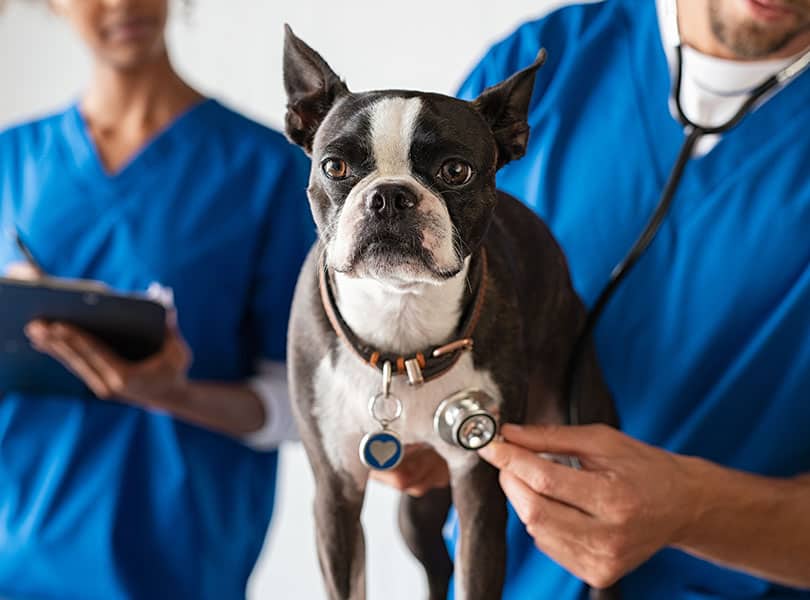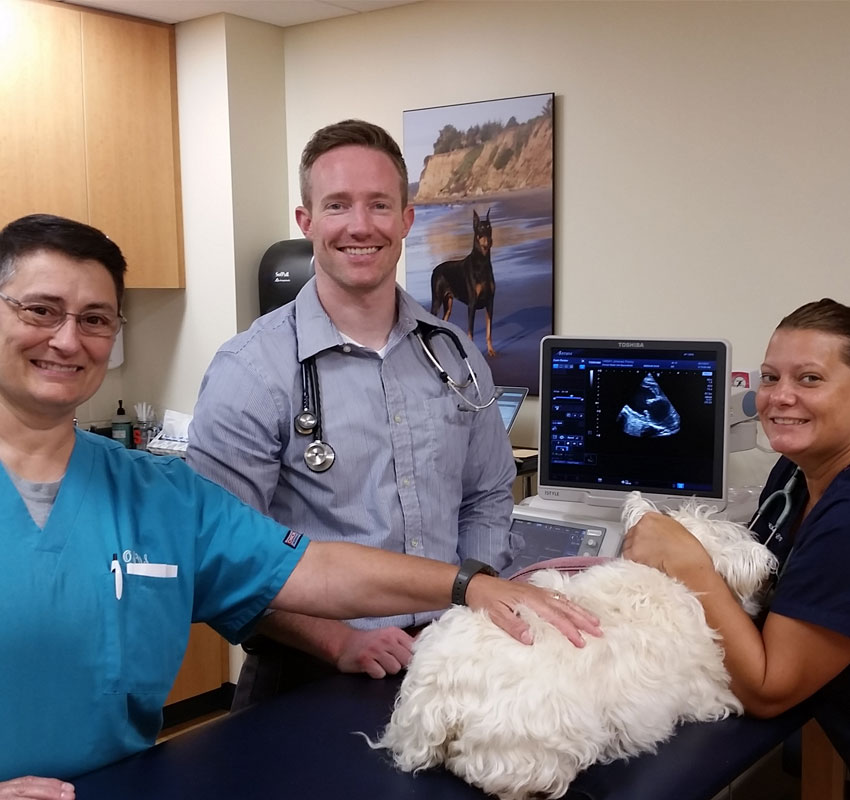Checking Out the Important Providers Used by a Veterinary Cardiologist: Understanding Ultrasound and CT Scan Strategies
Vet cardiologists play a crucial function in the health of pets by detecting and dealing with different heart conditions. They make use of innovative imaging techniques, such as cardiac ultrasound and CT scans, to provide precise evaluations. Each technique has its unique advantages and applications. Understanding these strategies is important for pet owners seeking the ideal take care of their buddies. What elements should pet dog proprietors consider when picking between these analysis tools?

The Duty of Veterinary Cardiologists in Pet Dog Health Care
Vet cardiologists play an important function in the medical care of pets, focusing especially on detecting and treating heart-related conditions. They possess specialized training that allows them to interpret complex diagnostic examinations and identify various cardio concerns. These professionals utilize sophisticated methods, such as echocardiography and electrocardiography, to analyze heart feature and framework accurately.Veterinary cardiologists additionally establish tailored therapy plans that may include medications, way of life adjustments, and, sometimes, surgical treatments. Their knowledge expands to educating animal owners regarding heart health, emphasizing the value of normal examinations and early discovery of possible troubles. Collaboration with basic veterinarians is essential, as it guarantees extensive look after pet dogs with thought cardiac problems. By providing specialized solutions, veterinary cardiologists significantly enhance the top quality of life for pet dogs and supply satisfaction for their proprietors, enhancing the value of heart health in total pet health.
Usual Heart Issues in Pet Dogs
Usual cardiac concerns in pets can greatly influence their health and top quality of life. Heart murmurs, different sorts of cardiomyopathy, and genetic heart problems are amongst the most widespread problems that vets run into. Board Certified Veterinary Cardiologist. Recognizing these problems is necessary for animal owners to assure timely diagnosis and ideal treatment
Heart Murmurs in Pets
Heart murmurs can be a source of issue for family pet proprietors, they are not always a sign of significant health and wellness concerns. A heart whispering is an unusual noise created by stormy blood flow within the heart. In pet dogs, these whisperings can be triggered by different variables, consisting of genetic heart defects, valve issues, and even anxiety during evaluations. Several pets with heart murmurs lead typical lives without significant health and wellness effects. To determine the underlying cause, vet cardiologists often employ analysis strategies such as echocardiograms and Doppler ultrasounds. Early discovery and analysis are vital, as they might aid take care of any possible heart concerns properly. Pet owners are encouraged to consult their veterinarian for a comprehensive assessment if a heart murmur is identified.
Cardiomyopathy Kind Explained
Cardiomyopathy incorporates a team of conditions influencing the heart muscular tissue, resulting in jeopardized cardiac feature in family pets. One of the most usual kinds include dilated cardiomyopathy (DCM), hypertrophic cardiomyopathy (HCM), and restrictive cardiomyopathy (RCM) DCM mostly impacts canines, triggering the heart to enlarge and weaken, which lessens its capacity to pump blood properly. In comparison, HCM is a lot more common in felines, characterized by the enlarging of the heart walls, frequently resulting in blocked blood circulation. RCM, though less typical, occurs when the heart muscular tissue ends up being rigid, restricting its ability to full of blood. Each kind provides special challenges in medical diagnosis and therapy, necessitating specialized veterinary cardiological analysis to ensure peak management and look after affected pet dogs.
Hereditary Heart Defects
Genetic heart problems stand for a considerable group of heart issues in animals, distinct from obtained conditions such as cardiomyopathy - Board Certified Veterinary Cardiologist. These issues are structural problems existing at birth, impacting the heart's regular function. Common kinds consist of license ductus arteriosus, ventricular septal problems, and pulmonic constriction. Symptoms might differ commonly, varying from mild to serious, and can consist of exercise intolerance, coughing, and problem breathing. Early medical diagnosis through sophisticated imaging strategies like ultrasound is important for reliable administration. Vet cardiologists play an important function in determining these problems and advising proper therapy alternatives, which might consist of medical monitoring or surgical intervention. Recognizing genetic heart defects enables for better results and boosted lifestyle for impacted pet dogs
Understanding Cardiac Ultrasound: Exactly How It Works
A substantial variety of vet practices currently use heart ultrasound as an essential diagnostic tool for assessing heart wellness in pets. This non-invasive technique utilizes high-frequency acoustic waves to develop images of the heart's structure and function. Throughout the treatment, a vet technician click here for info applies a gel to the animal's chest and uses a transducer to emit ultrasound waves. These waves bounce off the heart and surrounding structures, creating real-time images on a monitor.Veterinarians can analyze different aspects of cardiac health, consisting of chamber dimension, wall surface movement, and valve feature. In addition, cardiac ultrasound enables the discovery of problems such as liquid build-up and congenital heart defects. This method is essential for detecting problems that might not be visible through standard radiographs. By providing thorough details about the heart's anatomy and efficiency, heart ultrasound aids in creating reliable therapy strategies for animals experiencing heart problem.
The Value of CT Checks in Identifying Heart Conditions
Just how do CT scans improve the diagnosis of heart disease in vet medicine? CT scans give in-depth cross-sectional photos of the heart and surrounding frameworks, enabling vets to visualize complicated anatomical partnerships. This imaging method is specifically helpful in identifying congenital heart issues, cardiac tumors, and irregularities in capillary. By utilizing innovative imaging algorithms, CT scans can examine heart chamber sizes and feature, offering a complete view that might be difficult to accomplish with traditional methods.Additionally, CT angiography can picture blood circulation and recognize areas of stenosis or obstruction, which is crucial for planning prospective treatments. The speed and accuracy of CT scans also assist in fast diagnoses, crucial in emergency situation situations. Eventually, the unification of CT scans into vet cardiology greatly improves the precision of medical diagnoses, enabling targeted treatment plans and enhancing person outcomes for animals suffering from heart conditions.
Contrasting Ultrasound and CT Scan Methods
While both ultrasound and CT scans are invaluable tools in vet cardiology, they use distinctive advantages and constraints that affect their usage in diagnosing heart conditions. Ultrasound, or echocardiography, offers real-time imaging of the heart's structure and feature, permitting vets to analyze heart chambers, shutoffs, and blood circulation. It is specifically reliable for evaluating conditions like congestive heart failing and cardiomyopathy. Ultrasound may be limited in imagining certain physiological frameworks due to individual dimension or obesity.In comparison, CT scans offer comprehensive cross-sectional pictures of the heart and surrounding cells, making them ideal for identifying structural problems, tumors, or vascular concerns. Although CT scans give detailed understandings, they need sedation and may involve radiation exposure. Inevitably, the selection in between ultrasound and CT scans depends upon the specific medical scenario, the person's problem, and the info needed for an exact medical diagnosis.
Treatment Options Readily Available Through Vet Cardiology
Veterinary cardiology uses a variety of treatment choices tailored to attend to different heart conditions in animals. Therapy plans often start with lifestyle alterations, including diet regimen adjustments and workout adjustments, focused on improving general heart health. Medications play an important role, with cardiologists suggesting medications such as diuretics, beta-blockers, and ACE inhibitors to enhance and take care of symptoms heart function.In extra serious cases, interventional procedures, such as balloon valvuloplasty or stent positioning, might be required to relieve blockages or boost blood flow. For specific genetic heart defects, surgical choices might be discovered to fix architectural issues. In addition, recurring monitoring and follow-up treatment are important parts of an extensive therapy plan, allowing for prompt changes based upon the pet dog's action to therapy. Generally, vet cardiology concentrates on offering effective, individualized care to enhance the health and wellness and well-being of animal clients with heart disease.
Just how to Prepare Your Pet for a Cardiac Analysis
Preparing a pet for a cardiac evaluation is important to assure precise outcomes and a smooth procedure. Proprietors should first set up the consultation with the vet cardiologist and review any kind of details needs or issues. It is advisable to keep food for a minimum of 12 hours before the examination, as this assists enhance imaging quality during procedures like ultrasound or CT scans.Additionally, keeping a tranquil atmosphere on the day of the visit can help in reducing the pet dog's anxiousness. It is valuable to bring along any relevant medical documents, consisting of previous tests and medications (CT Scans For Animals). Owners must likewise make sure that their pet dog is comfortable and leashed throughout transportation to the clinic. Familiarizing themselves with the analysis procedure can my company alleviate worries and help in asking informed concerns throughout the examination. By following these actions, owners can add substantially to the performance of the heart assessment
Frequently Asked Questions
How Lengthy Does a Heart Ultrasound or CT Scan Take?
The period of a heart ultrasound normally varies from 30 to 60 minutes, while a CT scan might take roughly 15 to half an hour. Variables such as the individual's condition can influence these time price quotes.

Exist Any Dangers Linked With These Diagnostic Procedures?

Can I Keep With My Pet Throughout the Treatment?
The vet center's my response plan typically determines whether pet proprietors can continue to be throughout treatments. While some clinics encourage proprietor visibility for convenience, others might need separation to guarantee safety and perfect conditions for analysis imaging.
How Much Do These Diagnostic Examinations Commonly Price?
The expenses of diagnostic examinations, such as ultrasound and CT scans, normally differ based on area and center. Usually, prices vary from a few hundred to over a thousand bucks, showing the intricacy and technology entailed.
What Is the Healing Refine After a Cardiac Analysis?
The healing procedure after a cardiac evaluation includes monitoring the pet dog for any kind of prompt reactions, making certain comfort, and restricting exercise. Veterinarians typically give post-evaluation instructions to assist animal proprietors throughout this crucial healing duration. Heart whisperings, various types of cardiomyopathy, and genetic heart defects are among the most widespread problems that veterinarians encounter. A heart murmur is an uncommon sound produced by rough blood circulation within the heart. Cardiomyopathy incorporates a team of diseases impacting the heart muscle mass, leading to endangered cardiac function in animals. Hereditary heart issues stand for a significant category of cardiac issues in family pets, unique from obtained problems such as cardiomyopathy. Ultrasound, or echocardiography, supplies real-time imaging of the heart's framework and feature, enabling vets to examine heart chambers, shutoffs, and blood flow.